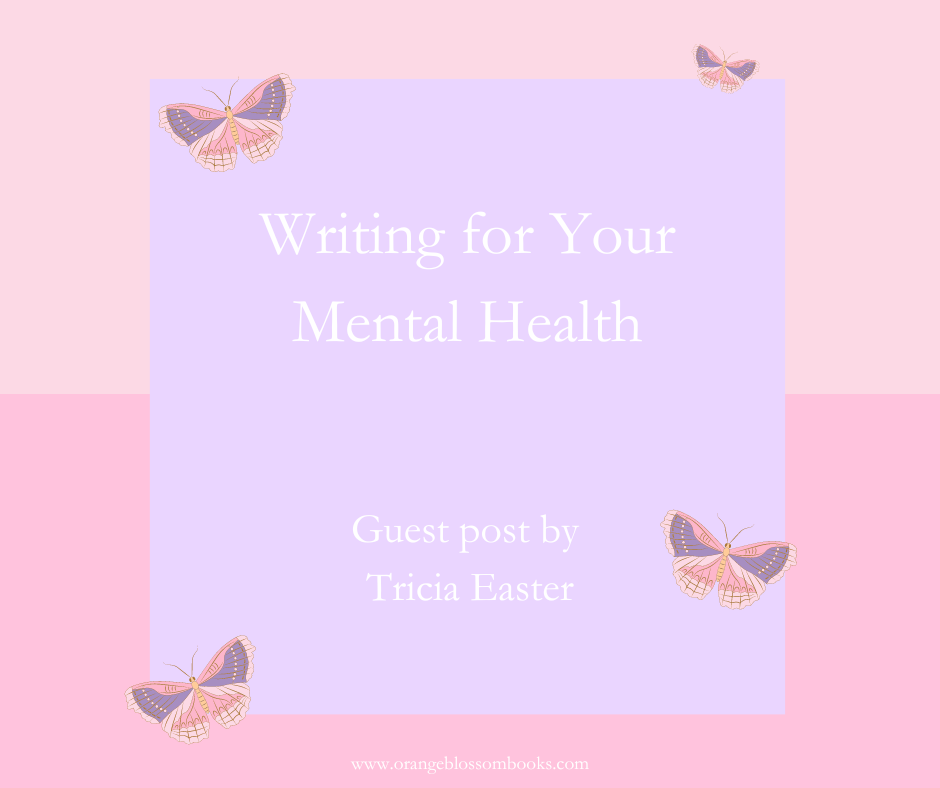|
Guest post by Tricia Easter Writing for Your Mental HealthIt wasn’t until my 40’s that I started a consistent writing practice to support my mental health. Before I had always written in a journal off and on. My writing practice was the outlet I needed to heal debilitating anxiety and rebuild my self-trust, which I lost because of the anxiety. I first started journaling daily to document my three-year intensive spiritual study of the different angels and archangels. While I had anticipated results from my spiritual studies, I was surprised about the impact my writing practice had on my anxiety. The cathartic nature of writing proved to be very healing for my mental health. Benefits of WritingSomething as simple as putting pen to paper can be transformative. Writing has the ability to align our mind, body, and soul so that we know the direction we need to go. It helps to clear our mind wo that we can feel calm and comforted. Done consistently, writing can extinguish the flames that ignite anxiety. With the shame and stigma associated with mental health, writing is a safe outlet for us to express ourselves openly and honestly. Below are three ways writing is beneficial for our mental health. Express and Process EmotionsSometimes when we’re experiencing anxiety, all our feelings get lumped into feelings of anxiety, stress, and overwhelm, just to name a few. Writing can help us sift through our feelings so that we have clarity about exactly what we’re feeling, what caused that feeling, and if there’s anything we need to do differently in the future. Gaining clarity about our emotions is a big step in uprooting anxiety. When we’re feeling frustrated or angry about something, writing in a journal is a healthy outlet, allowing us to hash everything out. Understanding exactly what we’re feeling helps to ease anxiety because we can then process these emotions. Find Our VoiceWriting helps us to connect with our true authentic self, who we are at our core. With busy and demanding schedules, it’s easy to lose touch with ourselves, and anxiety is a reminder that we need to reestablish that connection. I’ve noticed that many people who have anxiety (myself included) prefer to hide their true nature out of fear of judgement or persecution from others. And in hiding ourselves, we’re also not speaking up for ourselves. Many of us don’t really know what our own voice sounds like. Writing allows us to find our voice as we start to ask ourselves questions and answer them honestly. How do we feel about certain situations and people? What do we believe about the world around us? What’s important to us? What are our boundaries? Writing creates space for us to hear and reclaim our voice and express it in a safe way. Expressing and processing our emotions plays a big part in helping us find our voice too. Creative OutletWhether you write in a journal or for a specific genre, writing gets your creative juices flowing. Being creative is very therapeutic. Creating helps us to build our confidence, which can take many hits when dealing with mental health issues. Being creative also teaches us to listen to and trust our intuition, which we’re tapping into as we write. Writing and creating regularly also helps us to develop the capacity to think of new and different solutions to our problems. We’re better equipped to think “outside the box,” which helps when dealing with anxiety. Creativity helps us with self-expression too, because for many of us anxiety is a sign that our souls are screaming to be seen and heard. Start Your Writing PracticeI recommend a writing practice for everyone who has anxiety. Writing in a journal, writing a memoir sharing experiences, or doing some creative writing all support our mental health. Writing in whatever style lights us up sets healing in motion. The more we write, the more we shed light on our mental health which paves the way for deep healing. Below are three ways to start a writing practice. Get CozyFeeling cozy helps to settle our frayed nervous system and ensures we keep showing up daily for our writing. We’re more likely to show up for our writing practice if we enjoy how we feel doing it. The cozier we feel writing, the more we will look forward to it. We should make sure we’re writing in a comfortable spot, whether it’s on the couch, at the park, or at our desk. Lighting a candle and pouring a cup of tea are some examples of things we can do to create a cozy setting. Establishing a comfortable writing environment signals to our nervous system that we’re safe, allowing us safely navigate anxiety and heal it. Have FunHaving fun is along the same lines as getting cozy, except we’re tapping into our inner child. As a young girl I LOVED picking out fun journals, cool pens, and cute folders. Thinking about what colors and patterns we enjoy allows us to have fun with our writing. If we like our writing tools, we’re more likely to show up and write every day. Just seeing my beautiful notebooks gets me excited about writing in them. A Little Bit of StructureI’m hesitant to recommend adding structure to something creative, however setting a daily routine to write helps us to show up consistently. Adding some structure helps to make daily writing a pattern. And writing gets easier the more we do it. It gets easier to tap into that flow where the words come easily. Committing to a general time every day ensures that we get our writing in. We can select a time that works for us, such as in the morning before our day begins or before bed. Also, setting an intention for how much we want to write is helpful. For example, aiming for a certain word count or writing a page a day in a journal. Even if it seems like we’re writing gibberish, knowing ahead of time how much we intend to write helps us to get in the habit of getting words on paper (or our computers). The purpose of a writing practice is to build self-trust, to find and use our voice, and to ultimately heal anxiety. Using our writing as a tool helps us to safely lean into our anxiety and learn from it. Adopting a writing practice will help us understand anxiety and how it affects us. Writing is a tool that has the potential to free us from anxiety.
0 Comments
Leave a Reply. |
AuthorArielle Haughee is the owner and founder of Orange Blossom Publishing. Categories
All
|
Proudly powered by Weebly




 RSS Feed
RSS Feed